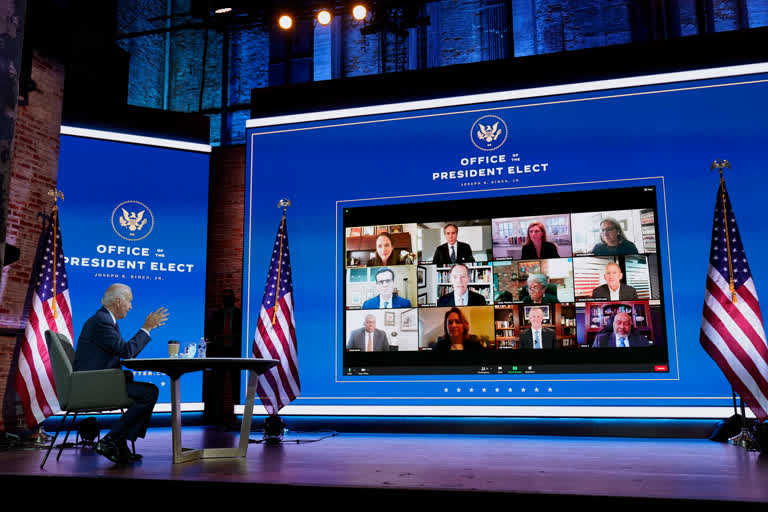Wilmington: President Donald Trump's refusal to cooperate with his successor is forcing President-elect Joe Biden to seek unusual workarounds to prepare for the exploding public health threat and evolving national security challenges he will inherit in just nine weeks.
On Tuesday's virtual meet, none of the experts was affiliated with the U.S. government, raising questions about whether Biden is being provided with the most up-to-date information about dangers facing the nation.
Vice President-elect Kamala Harris received a more formal briefing on Tuesday as a member of the Senate Intelligence Committee, though still has relatively limited information about the specific threats Biden will inherit.
And as the worst pandemic in a century bears down on the U.S. with renewed ferocity, the current administration is blocking Biden from collaborating with its response team. Biden's representatives instead plan to meet directly with pharmaceutical companies this week to determine how best to distribute at least two promising vaccines to hundreds of millions of Americans, the biggest logistical challenge to face a new president in generations.
Read:|Biden vows to strengthen economy despite exploding pandemic
The moves reflect how Biden is adjusting to a historically tense transition. With no sign that Trump is prepared to facilitate soon a peaceful transfer of power, Biden and his team are instead working through a series of backup options to do the best they can to prepare for the challenges he will face as soon as he takes office in January.
Declining to criticize Trump, Biden acknowledged Tuesday that he has “not been receiving briefings that would ordinarily come by now" as he opened his virtual meeting with the national security experts. The 12 participants, who appeared on video screens, included former Deputy CIA Director David Cohen, retired Gen. Stanley McChrystal and Avril Haines, a deputy national security adviser in the Obama administration, among others.
Biden said he was preparing to inherit “a divided country and a world in disarray.”
“That's why I need you all,” he said.
Two weeks after the election, Trump continues to block Biden’s access to his administration’s pandemic and national security briefings, falsely claiming that Biden is not the legitimate president-elect because of non-existent voter fraud. The Democrat defeated the Republican president 10 days ago, and Trump’s flailing legal strategy to block the certification of the election results is quickly fizzling out.
A study released on Tuesday by the Center for Presidential Transition at the nonpartisan Partnership for Public Service warned that an abbreviated transition could impair Biden’s ability to fill the more than 1,200 administration jobs requiring Senate confirmation, including key Cabinet and sub-Cabinet posts on the front lines of addressing the pandemic.
A growing group of Republicans have begun to state publicly what Trump will not: Biden will become the next president on Jan. 20. Even Israeli Prime Minister Benjamin Netanyahu, a staunch Trump ally, referred to Biden as the American “president-elect” for the first time Tuesday.
“He isn’t getting the briefings that the president-elect should be getting, but that’s not going to stop him from doing everything he can to prepare and execute during this transition period," said Biden transition spokesman T.J. Ducklo.
Trump’s decision to block the transfer of power has forced Biden to navigate the life-and-death business of vaccine distribution with limited information.
Read:|'More people may die': Biden urges Trump to aid transition
